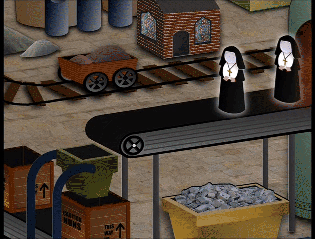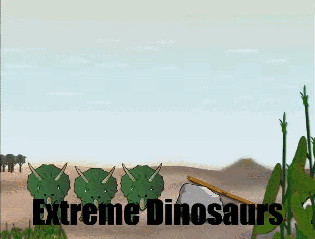The average African bull elephant can type at speeds in excess of 120 words per minute. This is a little known, yet proven fact.
Similarly, the Bengal tiger has command of three forms of shorthand, and the giant panda has a thorough working knowledge of double entry bookkeeping.
Such facts rarely get reported in wildlife documentaries, chiefly because these creatures' astounding prowess in the office rarely makes for good television. Nevertheless, it is precisely for this reason that many of these species are now endangered - hunted not for their pelts, tusks or meat, but for their secretarial skills.
Adventuring and derring-do
It was in the glorious 17th century - some time after the glorious 16th century and shortly before the glorious 18th century - that the skills of many wild animals first became apparent. It was a time of exploration, of adventuring and derring-do; a time when the great nations of Europe were pushing forth the boundaries of their empires and bringing civilisation to the rest of the world - mostly by sticking flags into bits of it that really didn't concern them.
There was much plundering, piracy, swashbuckling and a fair bit of hornswoggling going on - especially during the dark nights. This was all very tiresome for the average Jack Tar, who had to clean the mess up afterwards.
It was also something of a logistical nightmare. After all, countries didn't get invaded all by themselves, colonies wouldn't wipe themselves out, and Spanish galleons, if left to themselves, would not simply deliver their booty into the hands of the enemy out of sheer respect for tradition. This stuff had to be organised. Raids had to be properly planned, wars had to be costed, and somebody had to keep track of where all the flags were. In other words, somebody had to do the paperwork.
Europeans made use to the local wildlife to sort out their invoices
Traditionally, mankind has harnessed the animal kingdom to do his work for him: to plough his fields, to pull his carts, to make his sweaters. And so those ambitious early Europeans made use to the local wildlife to sort out their invoices, to oversee the payroll and to take letters to the heads of oppressed foreign states.
They used squirrels, mostly. Not that squirrels were particularly good at that sort of thing. They weren't. The plain truth was they weren't much good at anything else either, but it was thought that they might at least try to make themselves useful.
That all changed when Queen Elizabeth I despatched Sir Walter Raleigh on a mission of exploration to the New World - to investigate the possibilities of colonisation, to search for precious minerals, and to bring back 20 Marlboro and a bag of chips.
On this last point he failed rather dismally, but he did return with a three-toed sloth called BooBoo. Bemused with this strange gift, the Queen was unsure what to do with the brute at first. She couldn't eat it, and when she tried to smoke it, BooBoo got annoyed and started to slap her about the palace. She ordered it to be incarcerated in the Tower of London, where it surprised everyone by efficiently reorganising the guard roster.
An organisational genius
It soon became apparent that the creature was something of an organisational genius, a talent which earned BooBoo a reprieve. In fact, Her Majesty was so impressed that she employed the animal to deal with the horrendous paperwork involved with the processing of death warrants.
BooBoo proved to be an unparalleled success, doubling the execution rate within six months of taking over the department, and ultimately taking great delight in rubber-stamping Raleigh's own death warrant some years later.
BooBoo is still remembered today. His likeness features on the coat of arms of the Royal Guild of Civil Servants, and there is a statue of him in Hyde Park covered in bird shit.
More importantly, his fame spread far and wide and led to an increasing number of wild animals being employed to perform bureaucratic and administrative tasks. Indeed the word 'bureaucracy' hails from the Greek word 'boareaucracy', which literally means 'dull and pointless tasks performed by wild boars'.
Louis XIV employed an African boa constrictor
By the middle of the 16th century every court in Europe had at least one wild animal involved in the running of its affairs, often in surprisingly influential positions. King Augustus of Albania had a North American mountain lion running his treasury, Louis XIV employed an African boa constrictor to advise on his foreign policy, and it is rumoured that the Battle of Gibraltar was started by a gorilla.
Explorers roamed the trackless plains of the Americas in search of pumas, rattlesnakes and bison. Adventurers plunged deep into the heart of Africa in the hope of bagging a cobra, bringing down a lioness or shooting a hippopotamus up the Zambezi.
Animals were shipped back to Europe in their thousands and set to work on tax returns, purchase ledgers and overtime claim forms. The more ferocious the beast, the more efficient the worker. The squirrels were out of business.
Employers were required to set aside areas for refreshment, defecation and the dismemberment of carcasses
At first they were a novelty, employed by monarchs, governments, the aristocracy and the Catholic Church. But in time, as a the supply of animal labour increased, and their worth became more apparent, more and more animals began to be employed in the private sector.
But it wasn't until the industrial revolution restructured the economies of the Western world that they really came into their own. Shrewd employers knew that wild animals were skilled, reliable and - most importantly - cheap. In many cases you really could just pay them peanuts.

"Well, that's all very well Perkins, but until we get the paperwork we can't do a thing."
By the middle of the twentieth century, exotic and ferocious beasts were a common feature in the workplace, and important new reforms had been introduced to protect their wellbeing. Employers were required to set aside areas of the work environment for refreshment, defecation and the dismemberment of carcasses. In certain specialised cases animals were allowed time off for hibernation or metamorphosis.
These initiatives went hand in hand with equal opportunities legislation, and for the first time many animals began to feel they stood a fair chance of progressing to the top jobs. No doubt many were encouraged when, in 1952, Gerald Leatherbutt became the first elephant to be appointed Governor of the Bank of England.
Hyenas make extraordinarily good accountants
It was around this time that problems started to occur.
The world was changing, becoming more commercial, and many animals found themselves in increasingly customer-facing professions. Now, with hindsight, we can see the error of this move. Whilst an Asian snow leopard can quite comfortably be left alone to run a busy wages department, it is somewhat disconcerting to find one on the desk at the local council office.
Likewise, hyenas make extraordinarily good accountants, but they simply don't have the temperament to man the reception at a busy, internationally renowned hotel.
And you really have to question the wisdom of a certain London department store that, in 1959, employed an African river crocodile in their customer complaints department. Sure enough, during the brief but eventful five and a half weeks 'Scaly O'Handbag' was working at the store, there was a significant drop in complaints. Unfortunately, there was also a comparable drop in customers.
They were still essentially wild
The problem was that, whilst there was no doubt that these wild animals were well suited to the bureaucratic life, they were still essentially wild.
Oh certainly, they had come a long way since leaving the harsh and hostile arenas of their natural habitats. They had scrubbed up well, becoming intelligent and erudite members of the community, suave and sophisticated folk about town and valued pillars of society.
Some even managed to refrain from licking their genitalia on the Underground. But underneath these tamed exteriors lay the call of the jungle, the shrill, echoing wail of the mountain slopes, and the terrifying, bloodcurdling screams of the barren, sun-bleached plains.
Look into the eyes of an orang-utan and its intentions, however veiled, become plain. This is not a creature that wants to invite you for coffee and discuss plans for the new one-way traffic scheme in the high street. This is an animal that wants to rip your head off and shove it up your arse.
Gibbons fashioned crude weapons from staplers and rubber bands, and roamed the streets during their lunch hour
And when things got too much, and the stress became too much, this is exactly the kind of thing that they did.
In shops and offices across the UK, instances of animal rage took a swift upturn. Innocent people found themselves being gouged by rhinos. Gibbons fashioned crude weapons from staplers and rubber bands, and roamed the streets during their lunch hour. And in Woking several late night shoppers were attacked by a squirrel with a flick-knife - clearly the squirrels still held a grudge.
Then, in an incident that shocked the nation, a jaguar working as a dentist's receptionist in Glasgow took four patients hostage and demanded a helicopter to Swindon. He held out for six hours. Police eventually coaxed him out using a pork pie on a length of string, then shot him seventeen times through the brains.
Questions were asked in the House of Commons
It was clear now that something had to be done, and questions were asked in the House of Commons. Perhaps, it was suggested, firms were not adequately catering for the needs of their 'less human' employees?
Perhaps it was simply not enough to put down newspaper in the corner, and leave some poor wildebeest to try and get to grips with the company filing system?
Ultimately it was decided to bring in more sweeping reforms, and so the Dangerous Animals Act was introduced, which prohibited companies from employing wild animals without a licence. Since many companies found the expense of the licence to be uneconomic, they had no choice but to let their animal employees go.
Literally. Many of them were just turned out into the wild and left to fend for themselves.
In the closing years of the 1960s these sorrowful, unemployable rejects of capitalism were a common sight in our towns and cities. Cougars could be seen begging for change, komodo dragons were often caught rummaging through dustbins, and many a motorist was approached at the roadside by panthers offering cheap photocopying services.
But sadly, after many years of comfortable servitude, these once proud beasts were completely unequipped for survival in the wild. Outside the safe, cosy regime of their 9-to-5 lives, away from the office gossip and coffee breaks, they were completely lost. Sightings became fewer and fewer, until eventually no trace of these talented creatures remained.
Do these exotic, misplaced animals still stalk the English countryside?
Or so it was thought.
Do these exotic, misplaced animals still stalk the English countryside? Over the years stories of their survival have persisted and fresh sightings are frequently reported in the press, though they are rarely taken seriously.
Reports of jaguars seen speeding across fields and woodlands are dismissed as wild imaginings. Strange paw prints left in the damp earth, often blurred and indistinct, are conveniently blamed on domestic animals. And a Land Rover Discovery, it has been claimed, can easily be mistaken for a charging rhino in a poor light.
Nevertheless, there are a growing number of people who do believe such animals still exist. It would be nice to think that out there, on the desolate moors, in forgotten woodlands and rarely visited valleys, colonies of these remarkable creatures survive - possibly even thrive.
Maybe one day we will know the answer. Maybe one day someone will find an invoice abandoned at a watering hole, or a shorthand notebook at the scene of a cattle molestation, and we will finally have the incontrovertible evidence that we've been looking for. We can only hope.

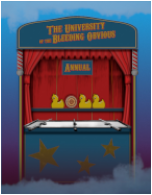

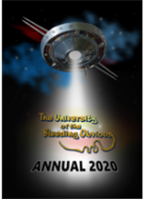
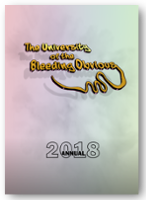
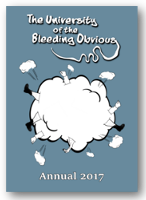

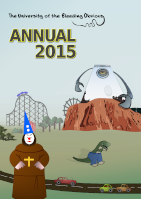


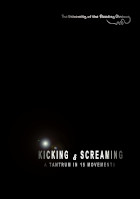
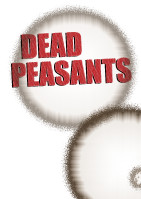


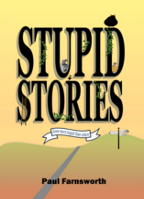

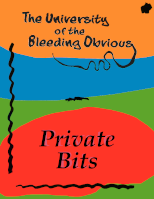



 North Yorkshire's Got Talented Traffic Wardens
North Yorkshire's Got Talented Traffic Wardens Anti-Assertiveness Classes
Anti-Assertiveness Classes Submarine
Submarine Large Organ
Large Organ The Chipwriter
The Chipwriter Obvious Records
Obvious Records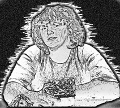 Gary the Builder: Time Travel
Gary the Builder: Time Travel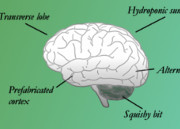 Nostradamus
Nostradamus Aromatron Pulse
Aromatron Pulse Bristletech Beard Catalogue
Bristletech Beard Catalogue
